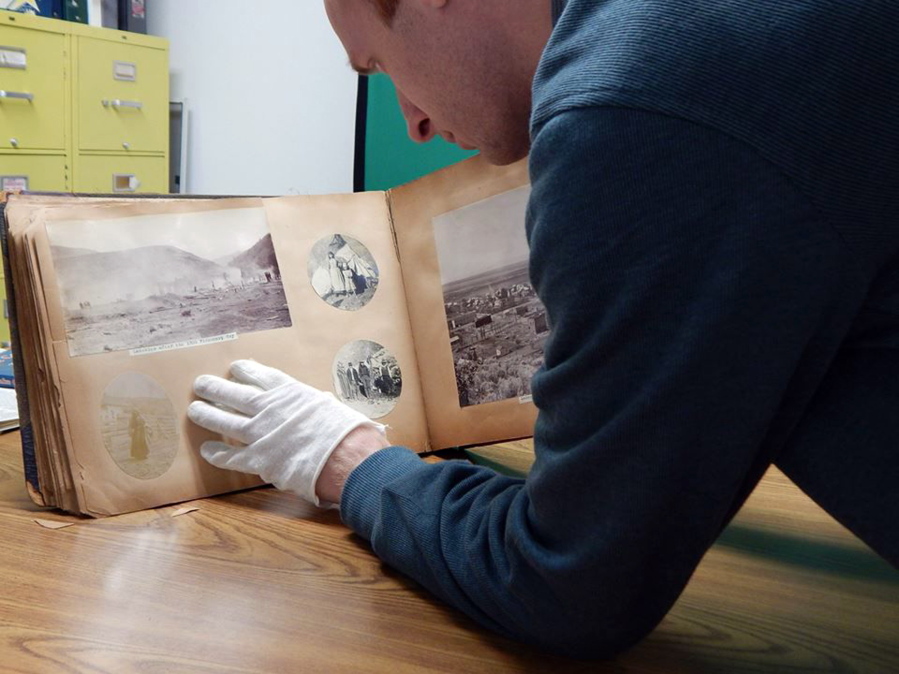LAKEVIEW, Ore. — Newspapers make great time capsules, documenting daily life throughout the years.
In the early settler days of Lake and Klamath counties, however, one intrepid newspaper family went above and beyond in preserving daily life, compiling hundreds of images of 19th century living in the region into a scrapbook recently rediscovered after being lost for over a century.
Last year, the Lake County Examiner was contacted by a local Lakeview resident, Andy Peavy, who had recently been sent an old family heirloom discovered at an estate by his friend Curtis Day.
A photo album originally given to Seneca Beach by his family for Christmas in 1897 had been found in Corvallis, handed down through generations and lost for years, the Herald and News reported.
The album depicted hundreds of images taken by the Beach family, operators of the Examiner and other newspapers on the West Coast from the 1880s into the early 20th century. The majority of the images, depicting life in Lake and Klamath counties, had never been previously published.
Day recognized the vast amount of images specific to Lake County and thought it was best returned to the area for further research, mailing the scrapbook to Peavy.
Peavy, in conjunction with the Examiner staff, meticulously researched the history of the Beach family and images, connecting the dots to many aspects of early settlement in the region and sharing information with local historians.
The album drew the interest of Bureau of Land Management Archaeologist Bill Cannon, who sought out grant funding for the Deschutes County Museum to digitize and preserve the entire album, which is now available for public viewing at the Lake County Museum in Lakeview.
Seneca Beach was one of five brothers from Iowa drawn to Oregon after their father Morgan Hart Beach, a doctor, moved to Klamath Falls to start a new medical practice in 1881 on recommendation by an old military friend who ran a stage station in Nylax (halfway between Fort Klamath and Linkville).
The brothers had all been involved in newspaper publishing in Stromsburg, Neb., establishing their own publication and handling all aspects of its operation. Initially just one brother, Frank, accompanied his father to the region, and his reputation as a newspaper man quickly spread.
Frank was asked to come to Lakeview to rescue the Examiner, which after three years of operation was on the verge of shutting down. Beach agreed, and soon had the Examiner re-established as one of the finest rural newspapers in Oregon.
Frank’s dream, however, was to establish a hotel in Portland, and after a year of operating the Examiner he left, intending to move to Portland. Beach was stopped along the way in Linkville by two businessmen, Harry Loos, publisher of the Yreka Union, and William Bowdoin, who convinced him to instead launch a newspaper there — the Klamath Star.
After Beach had the Star established, a telegram soon arrived from the original founders of the Examiner, Stephen P. Moss and Charles Coggswell, pleading for Frank to return to Lakeview to continue leading the Examiner. Beach agreed, but only if his brothers joined him.
From the mid-1880s until 1902, the Examiner was led by at least one Beach brother, at times all five working at the newspaper.
During this time, a massive fire destroyed not only the Examiner office but the vast majority of Lakeview in May of 1900, yet the brothers managed to print a special edition the next day and never missed a publishing date.
Eventually each of the Beach brothers moved away from Lakeview, establishing new publications elsewhere in California and Oregon. As reporters, the Beach brothers had a rare luxury for the time in their possession — cameras — and each were veritable shutterbugs capturing day-to-day life.
The Beach family scrapbook encompasses hundreds of photos taken by the brothers depicting local Native American tribes, family life, major events, communities and family vacations.
Seneca added to the album into the early 20th century, including many photographs from his visit to the 1901 World’s Fair in Buffalo, N.Y. and images from the Spanish-American War when one of the Beach Brothers accompanied Oregon’s Second Army regiment to fight in the Philippines.
Seneca, who relocated to Portland to establish a print shop, was a member of the Oregon State House of Representatives, and was part of a collective of state reps who traveled cross-country to attend the World’s Fair, one of the largest ever organized and by far the most infamous in history as it not only featured a new Thomas Edison invention called the lightbulb as well as an X-ray machine, but it was also the sight of President William McKinley’s assassination.
Beach meticulously documented the trip via photographs, from stops in Chicago and Toronto to a visit to the White House in Washington D.C. and New York.
Eventually the youngest Beach brother, Alvin Young Beach, left the Examiner as the last remaining in Lake County to establish a publication elsewhere, but thanks to their leadership and foundation the Examiner has never missed a publishing date in its 137-year run.
Frank Beach would eventually establish a hotel publication in Portland and earned a reputation as one of the finest newspaper men in the entire country, while Seneca retired from politics in 1909 to live out his days in Portland.
Earlier this year, Peavy passed away in Hawaii, but his act to donate the Beach family scrapbook has helped revive the history of Lake and Klamath County’s precarious early days through the lens of the Beach family cameras, sharing a perspective not seen in over a century.
Many of the photographs have been shared with local tribes and archaeologists and continue to be researched by the Lake County Museum, helping to both affirm and rewrite southern Oregon’s history.
The Beach family scrapbook is one of many historic photograph collections available for the public to view at the Lake County Museum in Lakeview.



